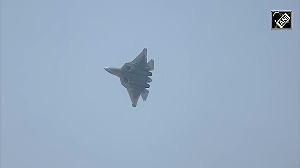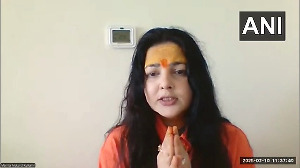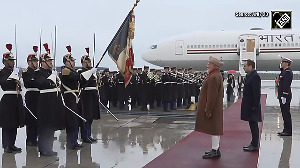

That the Bharatiya Janata Party leaders are yet to stomach their defeat in the general election is old hat.
Along with power they have also lost an image nurtured by former prime minister Atal Bihari Vajpayee's spin doctors -- of being a party of the future.
While Vajpayee's flexible approach on sensitive issues gave his government stability and wider acceptability, his pro-development and reformist image lent it sharp focus. Out of power, however, the party is left with nothing to show its core constituency; Vajpayee's legacy, often criticised as the middle path, may have served it well in office, but on the Opposition benches there is little value attached to it.
Ironically, even the Vajpayee government's biggest legacy -- economic reforms in the form of the India Shining campaign -- may actually fare better under Prime Minister Manmohan Singh, the original reforms man.
An issue-less BJP is thus undergoing a process of churning, and many in the party believe that former deputy prime minister L K Advani, and not Vajpayee, will be the centrepiece of the party. The latter, however, will continue to be the showpiece.
Arun Jaitley may hate the word 'drubbing', preferring the milder 'defeat', but the BJP's analysis posits that one of the main reasons for its poor electoral run was a lack of mobilisation of the Sangh Parivar's cadres in key constituencies.
Damage control is already under way. Vajpayee, Advani and party president M Venkaiah Naidu recently held a closed door meeting with Rashtriya Swayamsevak Sangh leaders in New Delhi. At the BJP's national executive meeting in Goa last month, RSS co-ordinator Madan Das Devi held lengthy discussions with more than 30 BJP leaders to plumb their mind about the electoral verdict.
There is already evidence of the Advani style of confrontational politics: the BJP's recent disruptive tactics in Parliament is attributed to the former DPM.
A party office-bearer and staunch Advani man, however, claims that the party's new-found belligerence will not harm it in the long run.
Advani, after all, is the man who powered the party from the margins of Indian politics to the centrestage in the late 1980s and early 1990s with his shrill Ram Janambhoomi campaign, and the hope is that he will manage an encore.
But the times, they are different: then, the BJP was just an Opposition party; today, it is a former ruling party, and as such is circumscribed by its stint in office.
Also, after the Gujarat riots of 2002, the party is understandably reluctant to portray itself as one advocating Hindutva. However, while political compulsions may demand that Vajpayee continue to be addressed as its 'tallest leader', practical considerations dictate that Advani be given absolute control as it happened in 1984.
Alongside, the BJP is also planning changes in its organisational structure, part of which is the induction of RSS workers and district-level leaders. Unconfirmed reports say a young RSS leader will shortly shift to the BJP. In turn, the RSS would like the BJP to vociferously protest against the Leftist agenda in education and the new government's economic liberalisation agenda.
There is cause for worry for the RSS. "The BJP leaders' public image is another area of serious concern. Imagine what will happen after the political exit of Vajpayee and Advani," says an RSS functionary.
The worry is not misplaced. Quite a few BJP leaders and former ministers are known to show off their flashy lifestyle, in some cases acquired in just five years. The old-fashioned RSS naturally is sensitive about what it calls their 'chal-charitra and vyavahar' [character and conduct].
An RSS office-bearer says, "The vyavahar [behaviour] of the New Delhi leaders and former ministers is a major issue in the post-election deliberations."
There are demands from within the BJP, too, that the New Delhi-based leaders should "connect" with the workers and district leaders on a regular basis.
Reportedly, the RSS and BJP are also deliberating on giving some concrete form to the Sangh Parivar, the amorphous phrase under which all Hindu groupings associated with the RSS are lumped. Proponents of the move argue that the vagueness about the Sangh Parivar enables the Congress and Leftists to malign "like-minded groups who advocate Hindu unity." But as of now, the idea will take wing only if it clicks with a larger section of the, well, Parivar.
Another major rethink within the BJP is over the role of caste in Indian politics and how best to tackle it.
The party had got its big breakthrough in Indian politics when Advani's rathyatra of the 1990s overrode the caste factor across the Gangetic plain. Advani's supporters waste no time in praising his Ram Janambhoomi movement for unifying Hindus.
Now, the BJP needs as strong and emotive an idea to "manage the caste factor in politics", more so because its flirting with Muslims ended in a disaster in the last election. While in power the BJP also could not lure any new social group to its fold. Worse, in north India the Dalits and Yadavs have resiled to their original political camp, leaving the BJP in a no-win situation.
While the BJP is in a dilemma over wooing caste-based groupings to boost its electoral fortunes, the RSS is in a bigger quandary. Given its opposition to the caste factor, which it considers to divide the Hindu monolith, how can it support or promote such dangerous liaisons?
The BJP sure is in for some interesting times.
Photo Credit: PRAKASH SINGH/AFP/Getty Images
Image: Rahil Shaikh






 © 2025
© 2025